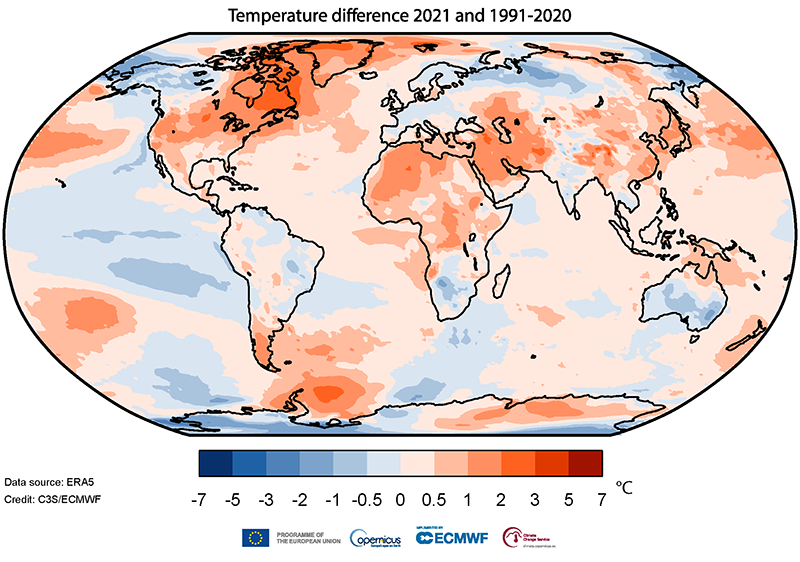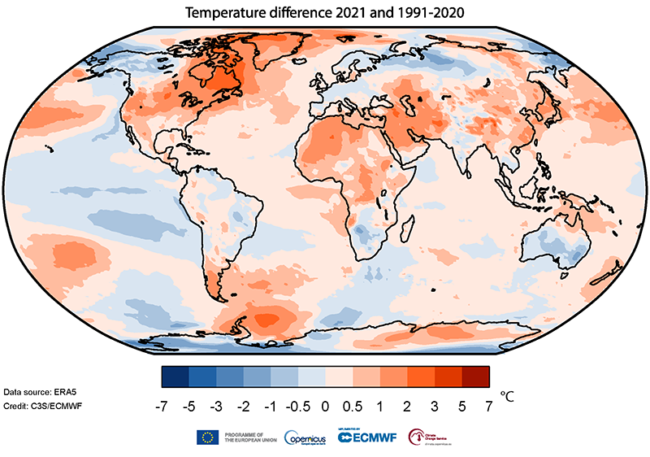
(The posting below is a writing experiment. I’m interleaving cold hard facts, the latest climate data, along with a metaphorical and totally fictitious micro-story about one lone remote cinema. Why? Data can be dull, it is an attempt to say something about how we as a species are not responding to the data in any meaningful way, and so we will reap the inevitable consequences).
On Jan 10, 2022, Copernicus, the EU’s Earth observation programme, put out a press release. Titled “Globally, the seven hottest years on record were the last seven; carbon dioxide and methane concentrations continue to rise“.
For those curious about the content, but simply can’t be arsed to click the link, I’ve been advised that there might be a clue within the title. However, I’ll also cover some of the detail here.
The Greystones Cinema
Sitting on the Irish coast south of Dublin rests the small village of Greystones. There, not too far from the shoreline, just the other side of the railway track, sat opposite the Shell garage is the Ormonde Cinema. Paddy Murphy had taken it on. It was the very last cinema in all of Co Wicklow. He had spent a great deal refurbishing it and so the interior was plush and sleek. “Build it and they will come“, he had thought to himself.
He was right.
Even with streaming being popular, folks liked the idea of having a real authentic cinema experience every now and then. Who could possibly resist the siren call of the latest blockbuster within this spruced up version of the old dilapidated 1947 edifice. Mr. Kavanagh, the original owner would have been amazed to see it now.
There had been warnings. Whispers that it was a fire trap and completely unsafe had been ignored. “Honestly”, Paddy thought to himself, “That simply can’t happen, they are scaremongering“.
2021 In context
Globally, 2021 has been one of the seven warmest years ever recorded in all of human history.
Global surface air temperatures
- Globally, 2021 was the fifth warmest year on record, but only marginally warmer than 2015 and 2018
- The annual average temperature was 0.3°C above the temperature of the 1991-2020 reference period, and 1.1-1.2°C above the pre-industrial level of 1850-1900
- The last seven years have been the warmest years on record by a clear margin
Copernicus have a graphical illustration …
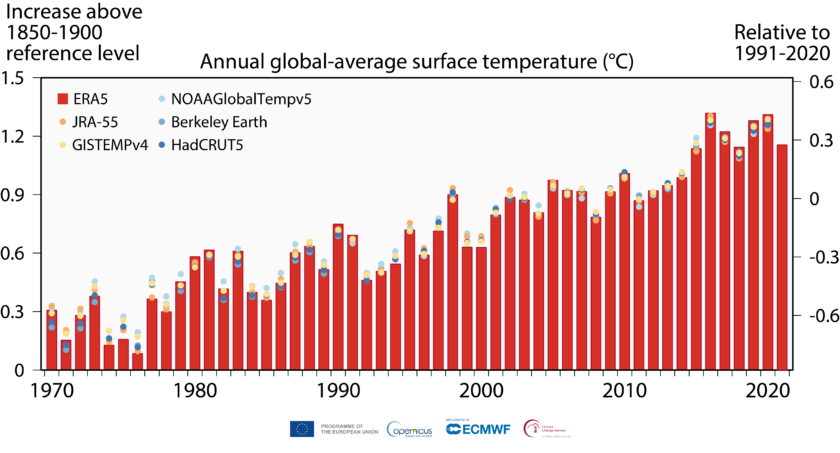
Within the above is data from six independent dataset …
- Red bars: ERA5 (ECMWF Copernicus Climate Change Service, C3S);
- Dots: GISTEMPv4 (NASA); HadCRUT5 (Met Office Hadley Centre); NOAAGlobalTempv5 (NOAA), JRA-55 (JMA); and Berkeley Earth. Credit: Copernicus Climate Change Service/ECMWF
Copernicus have published their data, the red bars, for 2021. The others have yet to do so.
They are all independently derived and published, yet there is general agreement.
Rather obviously the trend is upwards.
Smoke and No Fire
As Paddy was sitting in his office enjoying a glass of scotch and relishing his rising bank balance due to the success of his new venture, Shamus came rushing in. “Paddy, there is a smell of smoke in the packed Auditorium, what should I do?“.
“Now don’t you worry about that”, he shot back, “it is quite natural, nothing to worry about at all. The air conditioner that I got as a special from Mr Spurling, the previous owner, does a bit of that, it is the way it is.“
“Oh OK“, says Shamus. He then rapidly retreats back to the porn mag that he had been carefully reviewing earlier within his ticketing booth to help stave off the boredom. He mumbles, “I’ll just ignore it. As long as he is not worried, I’ll not worry“.
Paddy pondered this news a bit. He remembered that Mr Spurling had told him that he must get the system fully reconditioned by a professional, but he had decided it did not need it, and was good enough. Perhaps one day, but not today, everything was fine. No need to worry.
Extreme Events in 2021
2021 brought several high-impact extreme events.
In Europe July saw a very heavy rainfall event in western central Europe in a region with soils close to saturation, leading to severe floods in several countries, with the most heavily impacted including Germany, Belgium, Luxembourg, and the Netherlands. The Mediterranean region experienced a heatwave during July and part of August, with high temperatures particularly affecting Greece, Spain, and Italy. The European record for maximum temperature was broken in Sicily, where 48.8°C was reported, 0.8°C above the previous high, though this new record is still to be officially confirmed by the World Meteorological Organization (WMO). Hot and dry conditions preceded intense and prolonged wildfires, particularly in the eastern and central Mediterranean with Turkey being one of the most impacted countries, in addition to Greece, Italy, Spain, Portugal, Albania, North Macedonia, Algeria, and Tunisia.
In Northeast Canada, average monthly temperatures were unusually warm during both the start of the year and autumn. An exceptional heatwave occurred in western North America in June, with maximum temperature records broken by several degrees Celsius, resulting in the warmest June on record for the continent. Regional hot and dry conditions exacerbated a series of extreme wildfires throughout July and August. The worst affected areas were several Canadian provinces and west coast states in the USA, though not all regions were equally impacted. The second largest fire recorded in California’s history, the ‘Dixie Fire’, not only caused widespread devastation, but resulted in a significant reduction of air quality for thousands of people from the pollution. Air quality was reduced across the continent, as particulate matter and other pyrogenic pollutants emitted from the fires were transported eastward.
CO2 and CH4 concentrations continue to rise in 2021
The chart says it all. Our Greenhouse gas emissions, as measured by satallite, continue to rapidly climb ever upwards …
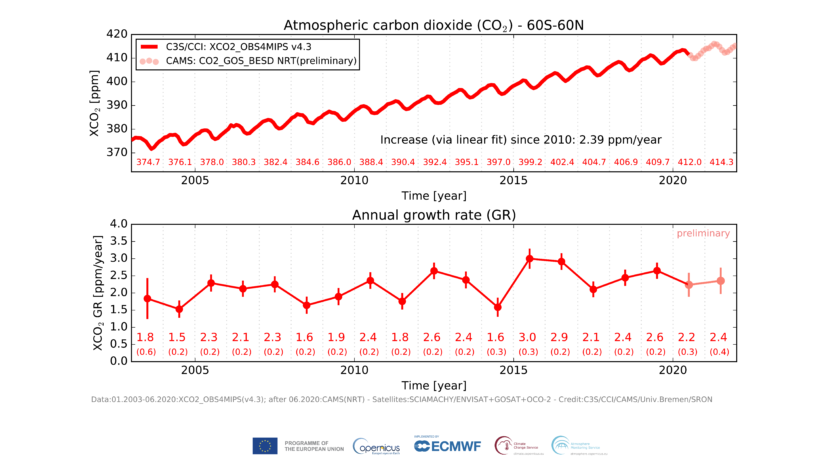
The data covers the period 2003-2021. The upper chart comes via satellite. The lower chart is derived for the data for the upperchart and shows you the growth rate.
Paddy Saves the Day
When billows of smoke commenced, Shamus abandoned his porn magazine along with the safety of the ticketing booth, and proceeded to run up and down the aisles in the main auditiourm screaming “Fire, Fire, Fire”. This startled the vast crowd who responded to this news by leaping up and panicking.
It was total chaos.
There was a mad rush to the door in the still dark auditiourm. Quick thinking Paddy, realising that he needed to take action, leapt to the front and proceeded to sing loudly. He had somewhere along the way missed his true vocation in life. As his deep baritone boomed out, the panic was rapidly quelled.
Paddy was not just good, his singing was far beyond that. It was professional, excellent, and truly mesmerising.
Everybody had stopped, nothing could be heard except Paddy’s singing. All had paused where they were to turn and listen to Paddy’s amazing voice.
The authorties, who picked through the burnt embers in the following days, noted that if it had not been for Paddy’s quick thinking to qwell the mad rush for the door, then the 320 people in the auditiourm would still be alive today.
Beyond Just Copernicus
You would think that perhaps the Copernicus press release would be sufficent to flag up serious concerns and raise the issue into being the number one news item. Alas, apparently not. It is just one more data point that will soon be forgotten by most.
Meanwhile there is a separate insight via another recently released paper that reveals that vast amounts of heat is being absorbed into our oceans.
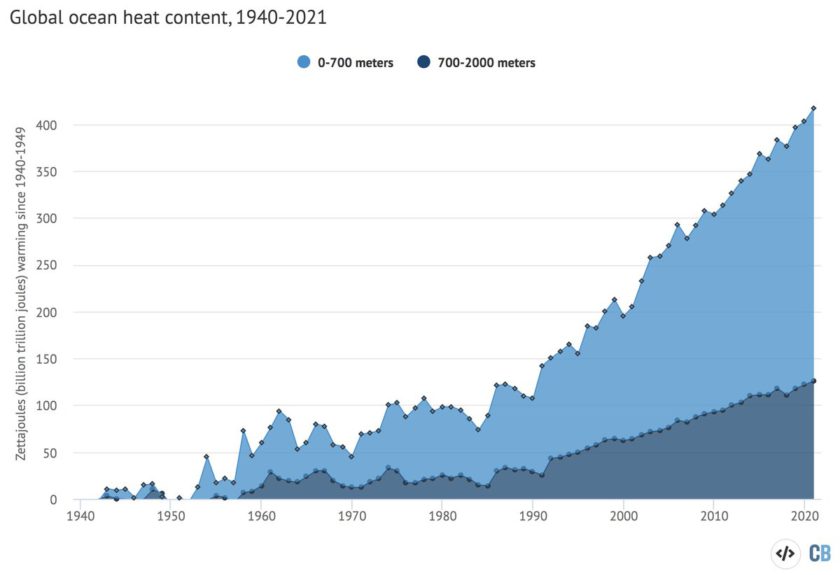
Ocean heat content is our best measure of the impact of human activity on the climate. More than 90% of all heat trapped by greenhouse gases is currently absorbed by our oceans.
In 2021, we saw the warmest ocean heat content since records began. More than 400 billion trillion joules higher than the 1940s.
Yes, that number really is too big for most to truly grasp the significence of it.
- The data for that can be found here
- The paper itself, published Jan 11, 2022 is available Open Access – Another Record: Ocean Warming Continues through 2021 despite La Niña Conditions
The time to be worried was in the past. Now is the time for immediate decisive action.
Will we do that?
Probably not until it too late to mitigate some of the worst consequences.
Further Reading
- Copernicus Press Release Jan 10, 2022 – Copernicus: Globally, the seven hottest years on record were the last seven; carbon dioxide and methane concentrations continue to rise
- Their raw format climate data can be accessed here.
- Their Monthly Climate Bulletin for December can be accessed here: https://climate.copernicus.eu/monthly-climate-bulletins
